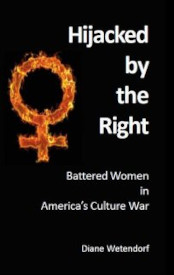Excerpt: Hijacked by the Right: Battered Women in America's Culture War
Diane Wetendorf, ©2013 All rights reserved. Available as an eBook from Books2Read.com Also available in print through Amazon.

Overview
The struggle for the heart of the domestic violence movement is a struggle over worldview and philosophy: whose worldview and whose philosophy will determine the provision of victim services to women? Hijacked by the Right presents domestic violence as the new front of the religious right's war on women. On one side is the Battered Women's Movement, a feminist community-based social justice model. On the other is the Family Justice Center movement, a conservative systems-based model. Is the Family Justice Center (FJC) model — which co-locates police, prosecutors, advocates, child protective services, job training, and faith-based services — an evolution of the Battered Women's Movement or its hijacking?
The Battered Women's Movement helped women to see and reveal the abuse they suffered at the hands of men who claimed to love, serve, and protect them. It also exposed the degrading oppression and abuse women received from the institutions they turned to for protection: the police, courts, religious institutions, medical providers, and their own families. The original domestic violence shelters and agencies focused on a woman's autonomy and choice: "what does she want us to do and how can we best serve her?" The FJC movement has co-opted this focus with institutional collaboration, protocols, and financial incentives.
Religious and political conservatives are using the FJC model to drive the Battered Women's Movement back underground, siphon off its funding, and close the doors of feminist-based shelters and agencies. The stakes for women — and for the nation — are too high to ignore. Wetendorf's argument centers around one question: "What could possibly go wrong when the institutional powers — law enforcement, government, corporate, religious, and traditional family values — enter into partnership with the others?"
Diane Wetendorf reveals a plot so sinister that it could be the basis for a crime novel. Her forceful argument against the Family Justice Center movement with its tactics to control victims and silence critics makes you stop in your tracks and think about radical religious fundamentalism infiltrating all aspects of our lives. — Local prosecutor
Women in America's culture war
The spark that lit the Battered Women's Movement was women's realization that the personal is the political. Women once again realized, as their foremothers had, that men ceaselessly imposed their will on women to enslave their bodies, their minds, and their spirits. The Battered Women's Movement still manifests through domestic violence shelters, advocacy agencies, and women's support groups. Women continue to support one another as they shed the weight of a lifetime's worth of conditioning, religious indoctrination, and socialization that keeps women "in their place." Women continue to gain strength to resist male dominance, refuse to surrender their personhood, and define feminism as "the radical notion that women are people."
The original philosophy of the Battered Women's Movement held that each woman could discover her authentic self, become attuned to her inner voice, think for herself, experience her own genuine emotions, and identify her own values. Women still struggle to give themselves permission to live an authentic life rather than a scripted one, and still struggle to live according to their own wills — not the will of men, men's institutions, and men's interpretation of God's will which, not incidentally, are often one and the same. Women are increasingly aware that any man, institution, or man-made god that seeks to control women's lives is not a protector but a dangerous predator.
Women have ample evidence that the Religious Right is willing to risk women's lives; all women need do is look at the Right's relentless assault on women's equality and reproductive freedom. The anti-equal rights agenda is not about protecting women but about controlling them, as the Religious Right seeks to deny women access to the very rights that would protect them. The anti-abortion agenda is not about reducing the number of abortions but denying women access to the very things that would reduce the number of abortions. And so it is with the anti- anti-domestic violence agenda: the Religious Right seeks to perpetuate rather than remedy the gender-based imbalance of power which allows male violence against women.
The goal of the Religious Right remains what it was at the beginning of the Culture War. They want women back in the home and out of the workplace, dependent on men, deprived of the opportunities and freedoms the Constitution is supposed to guarantee to all. If the FJC Alliance succeeds, it will do so because we treat it as if it were a legitimate player in the effort to free women from patriarchal violence. If it succeeds, it will do so because we did not stop it. The Religious Right wants to destroy the Battered Women's Movement, but it cannot do it. It cannot succeed because the Battered Women's Movement is not an organization that resides inside a building, but a social justice movement that lives in the minds, hearts, and spirits of the women who choose to resist male tyranny.
Family Justice Centers
The Family Justice Center (FJC) movement began in 2003 as part of George W. Bush's Faith-Based and Community Initiatives: "I believe government needs to stand on the side of faith-based groups, not against them. Our goal is to end the unfair discrimination against faith-based charities." Bush openly used evangelical language to sell his plan, allocated billions of dollars to "save a family in jeopardy — one soul, one heart at a time." The DOJ, Education, Labor, HHS, HUD, Agriculture, Commerce, VA, Homeland Security, USAID, and SBA were mandated to participate in the Initiative. Most if not all FJCs include chaplaincy or faith-based counseling programs. Undoubtedly, faith-based services do help many people, but many services are through conservative Christian organizations. Secular groups challenged the Initiative as being a blatant violation of the Establishment Clause of the Constitution.
Community policing is a strategy by which law enforcement attempts to build public trust by forming partnerships between citizens and the police. These community partners then become valuable sources of information for police and prosecutors in pursuing evidence-based prosecution. Critics say that police infiltration into community life serves the police far more than it serves citizens as it increases the reach of police. Partnerships come at a price. Many domestic violence victims don't go to the police because they are terrified of being caught up in the criminal justice system. They ask what good it will do to report an incident when the police are notorious for not believing women's reports. They know that calling the police may escalate an already volatile situation and lead to serious long-term negative consequences for them, their intimate partners, and their children. Community organizations face a conundrum: partner with law enforcement and risk losing the community's trust or alienate the police and risk the community's safety. Battered women's advocates are forced to collaborate with the very systems they historically monitored and held accountable.
Privatization transfers responsibility and funding for public services from the government to the private business sector. This opens a huge market for corporations to provide survivor counseling, risk assessment, security services, correctional facilities, batterers' counseling, spiritual counseling, crisis pregnancy services, addiction programs, job training, housing, childcare, parenting classes, budgeting... the list is virtually endless. It becomes a bait and switch scheme for cash-strapped community partners when corporate sponsors lose interest or a better investment comes along. Though many corporations claim social responsibility, they make their profits on the backs of women and children through lower wages, unsafe working conditions, poor health care benefits, and a plethora of family-unfriendly policies. The same corporations then turn around and fund programs that "help" the very women they exploit. Despite conservatives' claim that privatization reduces government spending, what it actually does is reallocate public tax dollars from public to private service providers.
All who seek services at a FJC have a right to know which service providers are faith-based organizations, and what faith-specific principles apply to their services. For example, a victim who is pregnant has a right to know whether her local FJC uses a pro-life facility for women's health care services so she can make an informed decision whether to use that service. Mothers have a right to know if FJC childcare programs have an evangelical underpinning. A victim should know whether her prosecutor favors faith-based counseling over certified batterer intervention programs. Secular community-based providers do not offer to pray with victims; if a victim expresses a desire for spiritual counseling, the provider helps her contact a counselor or clergy of her choice. In contrast, a hallmark of the FJC model is that spiritual counseling is available onsite. Some FJCs are located on church property or in complexes run by Christian organizations. Consider a victim's discomfort or fear if she or her abuser is a minister, if the chaplain is from her congregation, if she is of a non-Christian faith or of no faith.
The FJC model requires advocates to collaborate with the very systems that they historically monitor, challenge, and hold accountable. The question, "What does this victim want us to do and how can we best serve her?" is replaced with, "What is the new protocol, and how will we fund and implement it?" This charade of adversaries as allies requires everyone to pretend to like people they do not like, and to accept practices that they fundamentally abhor. Advocates must either censor themselves, thereby betraying their deepest beliefs and loyalties, or risk being ostracized and excluded from the work they love. They end up living a "life out of context," out of synch with their values, politics, and philosophy. What is so distressing is that service providers in the communities where the FJC sets up shop already had collaborative relationships where peoples' roles were obvious and in context. People didn't have to leave their values or politics at the door — relationships were candid. But a FJC disrupts this delicate network of collaboration, undermines established relationships that took years (decades) to build, and breeds mistrust among community members.
What can I say… my heart is aching after reading this book. The manipulation of women's lives by the institutional pillars of our culture is of the worst kind as it is built on the backs of the most vulnerable: survivors of domestic violence. — Shelter director
Download your personal copy of Hijacked by the Left from Books2Read.com Also available in print through Amazon
Go to index